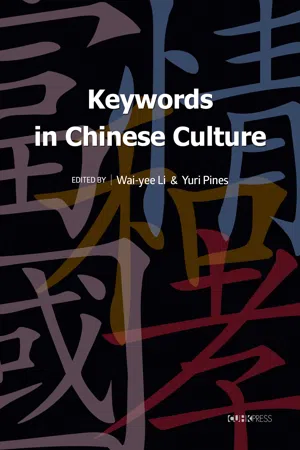
- English
- PDF
- Available on iOS & Android
Keywords in Chinese Culture
About This Book
What elevates a mere word to the status of keyword? What does it mean to translate a keyword and map its meaning against other languages?Like every major culture, Chinese has its set of "keywords": pivotal terms of political, ethical, literary and philosophical discourse. Tracing the origins, development, polysemy, and usages of keywords is one of the best ways to chart cultural and historical changes. This volume analyzes some of these keywords from different disciplinary and temporal perspectives, offering a new integrative study of their semantic richness, development trajectory, and distinct usages in Chinese culture.The authors of the volume explore different keywords and focus on different periods and genres, ranging from philosophical and historical texts of the Warring States period (453–221 BCE) to late imperial (ca. 16th–18th centuries CE) literature and philosophy. They are guided by a similar set of questions: What elevates a mere word to the status of "keyword"? What sort of resonance and reverberations do we expect a keyword to have? How much does the semantic range of a keyword explain its significance? What kinds of arguments does it generate? What are the stories told to illustrate its meanings? What are the political and intellectual implications of the keyword's reevaluation? What does it mean to translate a keyword and map its meaning against other languages?Throughout Chinese history, new ideas and new approaches often mean reinterpreting important words; rupture, continuities, and inflection points are inseparable from the linguistic history of specific terms. The premise of this book is that taking the long view and encompassing different disciplines yield new insights and unexpected connections.-------------"Far more than a handbook or reference, Keywords in Chinese Culture is a master class in literary and cultural interpretation. The nine concepts the contributors address are in themselves genuinely revelatory of abiding patterns in premodern Chinese culture and its reception, while the individual approaches the writers take to the problem of keyword interpretation add up to a thoroughgoing questioning of the ways in which the past delivers its meaning to new audiences. Every page opens the material in new and fascinating ways. As an introduction to a vast and diverse tradition and as a guide to the arts of reading, this volume is a skeleton key that will delight any scholar."—David Schaberg, author of A Patterned Past: Form and Thought in Early Chinese Historiography"The basic conceptual schemes of classical Chinese that define the underlying cognitive framework of Chinese intellectual history are explored in this book in the most promising way: important case studies of systematic conceptual analysis. This book goes to the cognitive roots of Chinese philosophical reflection."—Christoph Harbsmeier, author of Language and Logic in Traditional China
Frequently asked questions
Information
Table of contents
- Front Cover
- Half Title
- Full Title
- Copyright
- Table of Contents
- Acknowledgements
- Introduction
- Section 1. The Making of Keywords
- 1. How to Name or Not to Name: That Is the Question in Early Chinese Philosophy
- 2. Chinese he 和 in Many Keys, Harmonized in Europe
- 3. From “Scribe” to “History”: The Keyword shi 史
- Section 2. Socio-political Keywords
- 4. What’s in a Slogan? The Political Rationale and the Economic Debates behind “Enrich the State” (fuguo 富國) in Early China
- 5. “To Die for the Sanctity of the Name”: Name (ming 名) as Prime Mover of Political Action in Early China
- Section 3. Virtue Keywords
- 6. Embodied Virtue: How Was Loyalty Edited and Performed in Late Imperial China?
- 7. Filial Piety as an Emotion in Late Imperial China
- Section 4. Keywords of the Self
- 8. Before the Emergence of Desire
- 9. Looking for the True Self
- Afterword: Philological Reflections on Chinese Conceptual History: Introducing Thesaurus Linguae Sericae
- Index
- Back Cover